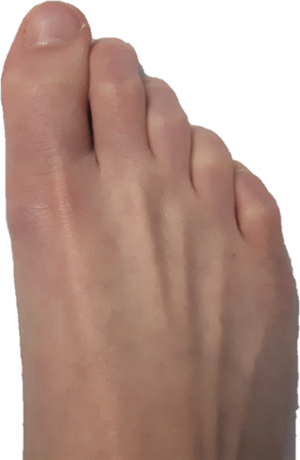
Morton’s Neuroma
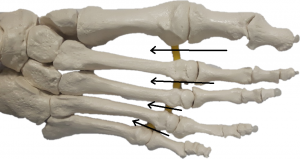
What is Morton’s Neuroma?
Morton’s neuroma is a compression of the digital nerve, between the metatarsals (bones at the forefoot). This compression causes nerve-like pain in the forefoot and into the toes. The most common area of pain originates between the third and fourth metatarsals. This is because the nerve running in the webspace between the third and fourth metatarsals is larger compared to the nerves in the other webspaces.
Causes
The webspace between the metatarsals can become smaller due to a collapsed metatarsal arch. This collapse compresses the nerve between the metatarsals. Over time, this nerve may thicken because of the body protecting the nerve against excessive pressure.
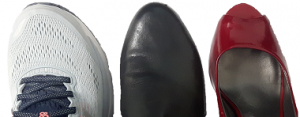
Footwear can play a large role in the development of Morton’s neuroma. Shoes with a narrow toe box compress the sides of the foot, and therefore, the metatarsals together. This increases the pressure to the nerves between the metatarsals. High heeled shoes also contribute by increasing the amount of pressure on the ball of the foot and pulling the metatarsals with the toes extended. Both these factors increase the pressure to the structures running between the metatarsals.
What will I feel?
With Morton’s Neuroma, you may feel a nerve type pain in the toes and/or ball of the feet. This nerve type pain may feel like burning, tingling, or numbness. Some will feel shooting pain into the toes with a specific movement or while walking.
Some may feel like they have a pebble in their shoe, or their sock is bunched up. This is a very common symptom of Morton’s neuroma.
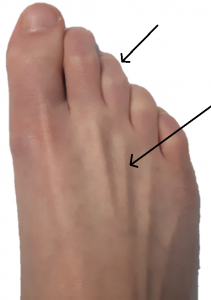
Signs of a metatarsal arch collapse
You may notice the tendons on the top of the foot protruding out and/or the toes clawing back. Callusing under the ball of the foot may be present. These are all signs that the metatarsal arch has collapsed.
Why now?
Factors that can contribute to the onset of Morton’s neuroma are metatarsal arch collapse, improper footwear or an accumulation over time
Because we walk on flat surfaces, we do not use the muscles supporting the metatarsal arch sufficiently. When the muscles become weak, the arch collapses. This collapse may also happen due to a sudden weight gain, such as pregnancy. This event may be recognized due to an increase in shoe size. When the arch collapses, the outside metatarsals spread further from each other, but the space between the metatarsals decrease and compress the structures running between.
Improper footwear is very common with Morton’s neuroma because it creates a constant compression of the nerve, even while sitting. Wearing these kinds of shoes while younger can create the damage and trigger later in life due to one of the other factors in this section.
The nerve compression may have been present for some time before the pain develops. Over time, the damage may accumulate to the point when the body recognizes the damage and develops pain.
How to treat it/reduce the pain
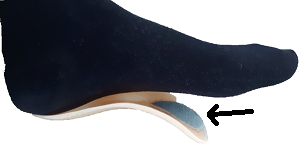
To reduce the pain mechanically, a good place to start is increasing the metatarsal arch. This releases pressure to the structures running between the metatarsals. To increase this arch, an orthotic device with a metatarsal pad is very effective. Stretches and exercises are another way to increase the arch, but this will take consistency and time.
Proper shoes are important to prevent nerve compression. Features to look for are a wide toe box, a wide fitting shoe and a low heel. If you are unsure how to fit your shoes properly, find a store that can understands the shoe fitting process and who carries shoes with multiple widths.
If this sounds like the condition you have, or you would like more information, let us know!
You must be logged in to post a comment.

Comments (1)
Pingback: Bunion and Hallux Valgus Information | On the Ball Orthotics